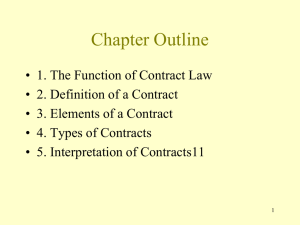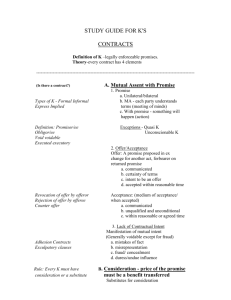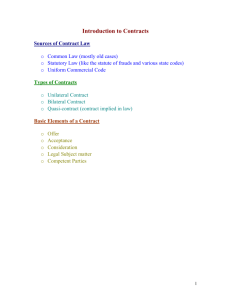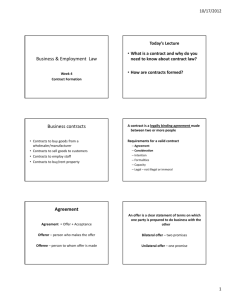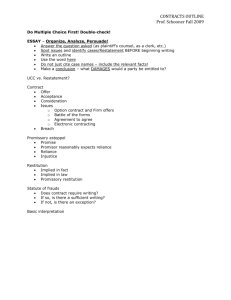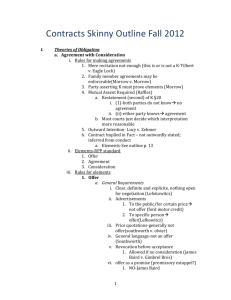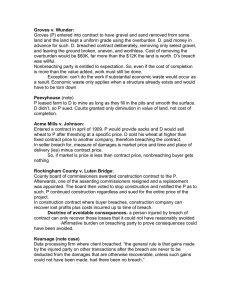Contracts I Checklist – Maggs – Fall 2010
advertisement
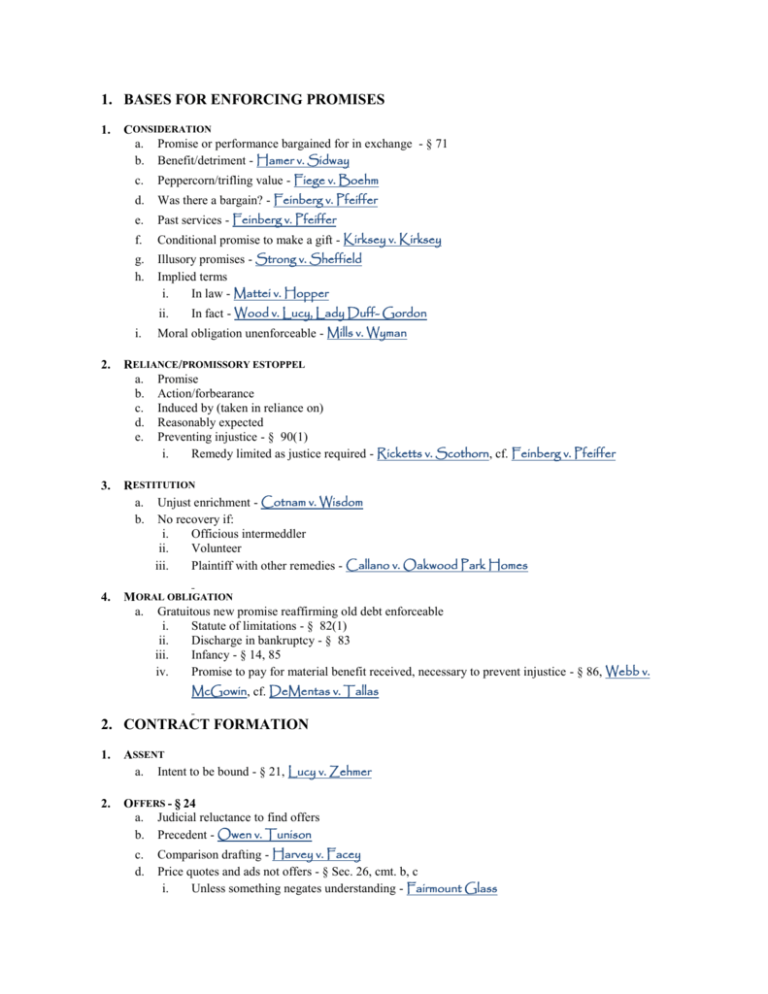
1. BASES FOR ENFORCING PROMISES 1. CONSIDERATION a. Promise or performance bargained for in exchange - § 71 b. Benefit/detriment - Hamer v. Sidway c. Peppercorn/trifling value - Fiege v. Boehm d. Was there a bargain? - Feinberg v. Pfeiffer e. Past services - Feinberg v. Pfeiffer f. Conditional promise to make a gift - Kirksey v. Kirksey g. h. Illusory promises - Strong v. Sheffield Implied terms i. In law - Mattei v. Hopper ii. i. In fact - Wood v. Lucy, Lady Duff- Gordon Moral obligation unenforceable - Mills v. Wyman 2. RELIANCE/PROMISSORY ESTOPPEL a. Promise b. Action/forbearance c. Induced by (taken in reliance on) d. Reasonably expected e. Preventing injustice - § 90(1) i. Remedy limited as justice required - Ricketts v. Scothorn, cf. Feinberg v. Pfeiffer 3. RESTITUTION a. Unjust enrichment - Cotnam v. Wisdom b. No recovery if: i. Officious intermeddler ii. Volunteer iii. Plaintiff with other remedies - Callano v. Oakwood Park Homes 4. MORAL OBLIGATION a. Gratuitous new promise reaffirming old debt enforceable i. Statute of limitations - § 82(1) ii. Discharge in bankruptcy - § 83 iii. Infancy - § 14, 85 iv. Promise to pay for material benefit received, necessary to prevent injustice - § 86, Webb v. McGowin, cf. DeMentas v. Tallas 2. CONTRACT FORMATION 1. ASSENT a. Intent to be bound - § 21, Lucy v. Zehmer 2. OFFERS - § 24 a. Judicial reluctance to find offers b. Precedent - Owen v. Tunison c. d. Comparison drafting - Harvey v. Facey Price quotes and ads not offers - § Sec. 26, cmt. b, c i. Unless something negates understanding - Fairmount Glass ii. "First come, first served" - Lefkowitz e. Possible responses to offer i. Acceptance - § 50 ii. Inquiry, comment, silence iii. Rejection - § 38 iv. Counter-offer - § 39 v. Purported acceptance with qualifications 1. Mirror-image rule - § 59 3. ACCEPTANCES a. Six questions i. Was there an offer? - § 24 ii. How did offeror invite offeree to accept? - § 32 1. Unilateral (complete performance) 2. Bilateral (promise to perform) iii. Did offeree completely perform/promise to perform as invited? - § 4 1. Implicit promise to perform by starting work - Ever-Tite Roofing iv. If offeree promises to perform, was promise made in manner permitted by offer? - § 30(2), Allied Steel v. Was notice of acceptance required? 1. Unilateral: No - § 54(1), Carlill v. Carbolic Smoke Ball Co. 2. vi. b. c. 4. 5. 6. Bilateral: Yes - § 56, White v. Corlies & Tift Did offeree provide notice of acceptance? - Int'l Filter Silence not acceptance, exceptions - § 69, Hobbs v. Massasoit Whip Co. Mailbox rule, exceptions - § 63 TERMINATION OF OFFERS a. Lapse of time - § 41 b. Revocation by offeror - § 42, 43, Dickinson v. Dodds c. Death of offeror - § 48, Earle v. Angell d. Rejection by offeree - § 38, Columbus Rolling Mill i. Mirror-image rule LIABILITY DESPITE APPARENTLY FAILED NEGOTIATIONS a. Breach of implied promise not to revoke offer (option contract) - § 45, Drennan v. Star Paving b. Breach of assurances during negotiation - Hoffman v. Red Owl Stores c. Breach of contract to negotiate in a particular manner - Channel Home Centers v. Grossman DEFINITENESS a. Terms reasonably certain - Varney v. Ditmars b. Reluctance to find indefiniteness - Toys 3. REQUIREMENT OF A WRITING FOR ENFORCEABILITY 1. STATUTE OF FRAUDS a. Marriage - § 124 b. Year - § 130, Klewin c. Land - § 125 d. Executor - § 111 e. Goods - UCC 2-201 f. Suretyship - § 112, Langman v. Alumni Assoc. of UVA 2. REQUISITES OF A SIGNED WRITING a. Subject matter b. Essential terms c. Signature of party to be charged 3. EXCEPTIONS TO THE WRITING REQUIREMENT a. Restitution b. Equitable estoppel c. Part performance - Richard v. Richard d. Promissory estoppel? - Monarco v. Lo Greco 4. POLICING THE BARGAIN 1. CAPACITY (VOIDABLE) a. Infancy - § 14, Kiefer v. Fred Howe Motors b. 2. Mental infirmity - § 15, Ortelere, cf. Cundick v. Broadbent DURESS, MODIFICATION, ATTEMPTED MODIFICATION a. Not enforceable if: i. Duress - § 175, 176 ii. Pre-existing duty - § 173, Alaska Packers b. Enforceable if: i. Original contract canceled - Schwartzreich ii. Changing circumstances (modern modification rule) - § 89, Watkins v. Carrig 3. MISREPRESENTATION, CONCEALMENT, NONDISCLOSURE (VOIDABLE) a. Fraudulent/material misrepresentation - § 162, 164 b. Active concealment vs. bare nondisclosure - § 160, 161, Swinton i. Confidential relationship vs. arm's length c. Half-truth - Kannavos 4. MISTAKE a. Mutual i. Mistake of fact vs. incorrect prediction - Sherwood v. Walker, cf. Wood v. Boynton, Stees v. Leonard ii. Mutual iii. Basic assumption iv. Material effect v. Affected party does not bear risk of mistake b. Unilateral - § 153 i. Party does not bear risk of mistake ii. Unconscionability 5. DENYING SPECIFIC PERFORMANCE a. No equitable relief when: i. Damages are adequate remedy - § 359 1. Determining adequacy of damages - § 360 ii. Grossly unfair exchange - § 364(1)(c), McKinnon v. Benedict 1. Prospectively, not retrospectively - Tuckwiller v. Tuckwiller 6. PUBLIC POLICY (VOID) - § 178 a. Promise to commit tort - § 192 b. Marriage - § 189 c. New categories sometimes, but not always, recognized - Black Industries v. Bush 7. EXCULPATION CLAUSES IN ADHESION CONTRACTS a. Strict construction - § 206, Gallligan v. Arovitch b. Adequate notice - § 211, Klar c. d. e. Public policy - § 178, O'Callaghan, cf. Henningsen Unconscionability - § 208, UCC 2-302(1), cmt. 1 Statutes regulating substance of contracts 5. REMEDIES 1. 2. SPECIFIC PERFORMANCE a. Limitations i. Damages would be adequate - §359, 360 ii. Bargain was unfair – McKinnon v. Benedict; Tuckwiller v. Tuckwiller EXPECTATION DAMAGES a. Loss in value + other loss – cost avoided – other loss avoided b. [what ∆ promised – what ∆ delivered] [cost π expected in performance – cost π actually incurred] c. Limitation i. Avoidability – Rockingham County v. Luten Bridge 1. Constructive Service – Parker v. 20th Century-Fox ii. Incomplete or defective performance 1. Jacob & Youngs v. Kent; Peevyhouse v. Garland Coal cf. Groves v. John Wunder iii. Uncertainty – Collatz cf. Fera v. Village Plaza 3. 4. 5. 6. iv. Unforeseeability – Hadley v. Baxendale LIQUIDATED DAMAGES a. Limitations i. Penalty – Dave Gustafson v. State ii. Unconscionability - Henningsen RELIANCE DAMAGES RESTITUTION DAMAGES NOMINAL DAMAGES - $1 OR 6¢
